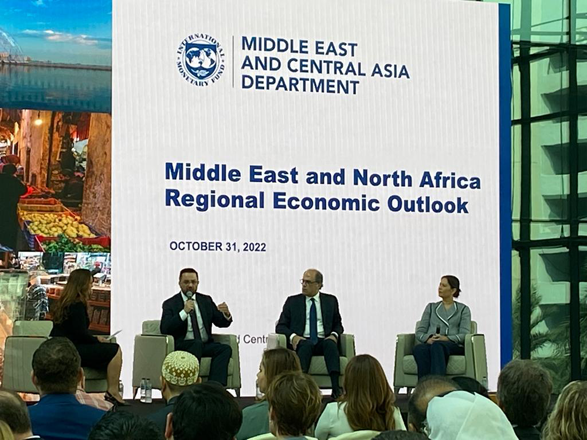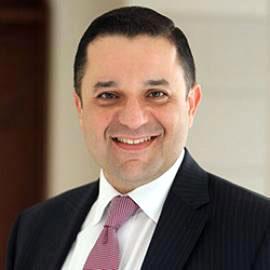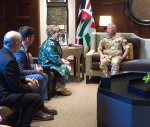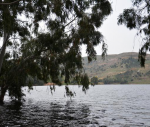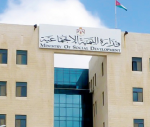You are here
AHSF session on finance reform sheds light on turning crisis to opportunity
By Maria Weldali - May 15,2023 - Last updated at May 15,2023
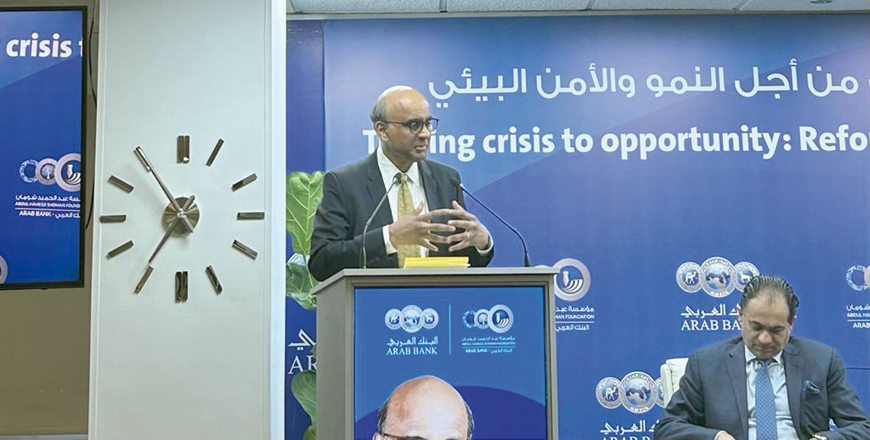
Singapore’s Senior Minister Tharman Shanmugaratnam speaks during a session organised by the Abdul Hameed Shoman Foundation on Sunday (Photo by Maria Weldali)
AMMAN — Jordan has the lowest financial risk of any country in the MENA region, revealed Finance Minister Mohamad Al-Ississ during a session on global finance reform organised by the Abdul Hameed Shoman Foundation on Sunday.
The session titled “Turning Crisis to Opportunity: Reforming global finance for development and ecological security,” featured addresses from both Al-Ississ and Singaporean Senior Minister Tharman Shanmugaratnam, who covered global finance reforms and their connection to modern national development programmes.
Reflecting on the Jordanian experience, Al-Ississ noted that the Kingdom has a “truly independent monetary policy”, which has proven to be effective over time.
In 2019, Jordan moved ahead with a serious reform plan, and has built its buffers in a progressive manner, not in times of crises, but prior, according to the minister.
“Four years later, we have hit every revenue target” progressively and without pressuring the middle class, Al-Ississ said during the session.
Back in 2020, Jordan was among few countries that was capable of achieving its revenue targets without having to increase its rates, the minister added.
Al-Ississ also noted that Jordan has significantly and transparently increased its capital expenditure, emphasising the role of good governance.
“We have achieved macroeconomic stability, but still we have a lot to do regarding microeconomic growth,” he noted, stressing that macroeconomic frameworks should not be confused with microeconomic policies. However, “macroeconomic frameworks are the base on which we would ensure that Jordanian households have higher standards of living,” he said.
Jordan has survived various crises through maintaining its resilience, Al-Ississ noted. “But there remain many challenges that still need to be met, including unemployment and poverty,” the minister said.
Citing such a challenge, Al-Ississ said: “We do one of the best jobs worldwide in educating our women, and we do one of the worst jobs in employing them.”
In his keynote address, Shanmugaratnam said: “The fundamental task we have is to build resilience and optimism in an era of disorder and profound human insecurity.”
Shanmugaratnam called for an urgent change in the orientation of old national policies in order to address the challenges of the global economy, financial crises and environmental shocks, which he described as “becoming more intense and frequent”.
The world is not dealing with random crises; rather there is a reoccurring pattern, according to the senior minister, who is also Co-Chair of the Global Commission on the Economics of Water. The combination of ecological and geopolitical shifts, have defined “an era of disorder and insecurity,” he said.
According to the senior minister, today’s world requires three major reorientations. First, more importance should be attached to prevention and preparedness, instead of responding to crises after they occur. Second, focus should be shifted to building buffers during calmer times. Finally, more investment is needed in collective action to confront challenges of a collective nature, Shanmugaratnam explained.
Talking about the restructuring of policies, the Singaporean minister said that policies need to be designed to address both national development needs and the global public good. He also referred to the importance of investing in international financial institutions, with the International Monetary Fund being the global anchor.
“We should build momentum in the direction of these changes…and move ahead, even if we have not got it perfectly designed,” the Singaporean minister noted. “Do not let the perfect get in the way of the urgent.”
The longstanding Jordanian-Singaporean ties have grown steadily over the years, with Jordan being one of the four countries that jointly sponsored Singapore’s UN application after its independence in September 1965, according to organisers.
Diplomatic relations between Jordan and Singapore were established in 1988.
The Kingdom maintains strong trade relations with Singapore, and in 2004, Jordan became the first Middle Eastern country to sign a Free Trade Agreement with bilateral trade volume reaching $134 million the same year.
Related Articles
AMMAN — As the US and Europe are hitting on inflation, each hit has spillover effects on the Arab region, said Jordan Minister of Finance Mo
AMMAN — There are no plans to remove subsidies as part of the International Monetary Fund (IMF) programme, Minister of Finance Mohamad Al-Is
AMMAN — In the final of a series of sessions for finance ministers under the Saudi G-20 Presidency, Minister of Finance Mohamad Al-Ississ co


